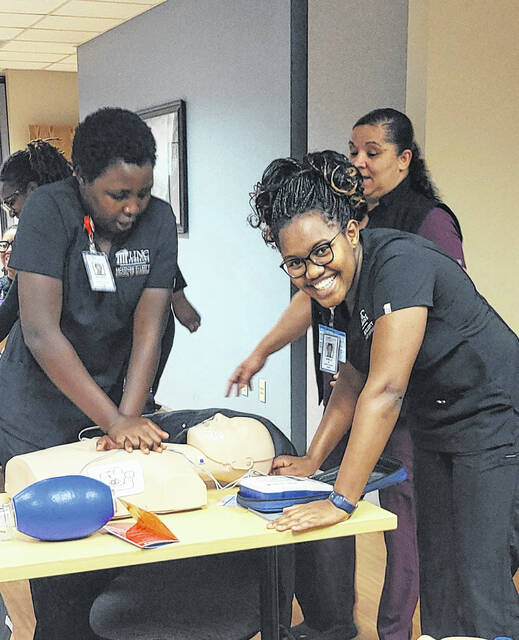
Recently, Scotland Health provided a two-day ACLS certification training to 26 senior nursing students, providing them with critical skills and enhancing their clinical experience while preparing them to transition into professional practice.
Courtesy photo
PEMBROKE — A new partnership between the McKenzie-Elliott School of Nursing at The University of North Carolina at Pembroke and Scotland Health Care System is providing nursing students with more than just classroom knowledge — it’s providing life-saving skills and a competitive edge through Advanced Cardiovascular Life Support (ACLS) certification training.
This groundbreaking collaboration bridges the gap between academic instruction and clinical readiness by immersing nursing students in high-stakes, real-world emergency response scenarios. The training allows students to build confidence and competence in life-saving procedures, including treating cardiac arrest, stroke and other medical emergencies.
“This partnership is about empowering our students to step into their careers with a deeper sense of readiness and purpose,” said Ronnie Tunstall, director of Pre-Licensure Programs and clinical assistant professor. “By the time they graduate, they’ll already be equipped with certifications that many nurses don’t receive until after entering the workforce.
“We are all thrilled about this new collaboration we are building between the university and the hospitals across the region, and this was a huge first step,” Tunstall said.
Recently, Scotland Health provided a two-day ACLS certification training to 26 senior nursing students, providing them with critical skills and enhancing their clinical experience while preparing them to transition into professional practice. Students learned advanced clinical skills, such as advanced airway management, emergency cardiovascular pharmacology and complex resuscitation. ACLS training is required for registered nurses in critical care units, emergency departments or cardiac care settings.
“The benefit was so rich,” said senior Jessica Stancikas. “Going into the training, I had no clue what we were in for. Afterward, I was so grateful. It gave me a clearer understanding of heart rhythms and medication administration, especially during critical situations, and provided valuable hands-on experience before facing a real-life code situation.”
Senior nursing student Matteo Rojas said the ACLS training has been one of the most rewarding parts of his nursing education.
“It was not only a great learning experience, but it also went a step further by allowing us to apply what we learned to other topics and lessons throughout the semester,” Rojas said.
Rojas added that the training helped make him a more competitive job candidate.
“Being able to tell people we are ACLS certified benefits us as soon-to-be graduates because we will have an edge during the interview process,” he said.
This marks the first collaboration between UNCP and Scotland Health to offer ACLS training. Scotland Health covered the $300 certification and provided resume-building, interview prep, and workplace professionalism workshops.
Rachel Moore, assistant director of Human Resources at Scotland Health, says the partnership signifies the hospital’s investment in UNCP students’ success while addressing the state’s nursing shortage.
“We are excited about this partnership with Scotland Healthcare System and UNCP, specifically with the McKenzie-Elliott School of Nursing,” Moore said. “This is one of our commitments to keeping professional relationships with our institutes of higher learning. For us, we want their graduates to come out as prepared as possible and to do that, we need to keep these partnerships going.
“These partnerships are essential to ensuring our institutes of higher learning are meeting the workforce’s needs, specifically for healthcare, in the area,” Moore said.
